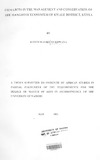| dc.description.abstract | The purpose of this study is to investigate the nature and sources of conflicts between the
parties interested in the exploitation, management and conservation of the mangrove
ecosystem. The study also strives to identify the strategies of resolving the conflicts that
characterize mangrove management. The study vas carried out between early February
and March 1999 in Kwale District, Kenya.
To achieve these aims, the methodology employed used both primary and secondary
sources of information in data collection. Secondary data were obtained from library
research while primary data was collected from selected respondents through survey
interviews, informal interviews, life histories and focus group discussions. Because of
the nature of the data we collected, both qualitative and quantitative techniques were used
in the data analysis.
The research findings reveal that although the local people understand their environment
(mangrove ecosystem) very well, they do not participate as true partners in designing,
planning and managing conservation programmes. The findings also indicate that many
people are unable to exploit the mangroves or go fishing due to expensive licenses, poor
transport, low business, long procedures in acquiring licenses and/or permits and lack of
capital and credit facilities.
It is generally observed that there is poor information flow to and from the local
populations and that there is lack of coordination between the management organizations.
The conflicting roles between the resource users themselves and between resource users
and protectors can be discerned. Furthermore, the roles of the management organizations
also conflict.
This study, therefore, recommends that the authorities concerned should sensitize those
interested in the mangrove ecosystem" on the need to ensure that the local people
participate as true partners in designing, managing and in conservation programmes and
propose ways of resolving the prevailing conflicts. The study also suggests ways of
fostering community understanding, as this is on way of making participation and
management easier.
Finally, the study calls for more social science research on the mangrove ecosystem, as
most works have been done by natural scientists who are interested in the biological
structure and ecological factors of mangroves rather than the socio-economic perceptions
of those living close to the ecosystem. It is recommended that researchers should also
focus on the people living around the mangrove ecosystem rather than concentrating on
the resources only. | en |

